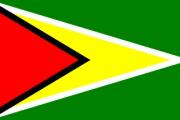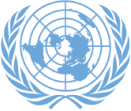Statement by the Honourable Amna Ally, Minister of Social Protection on behalf of CARICOM to the Sixty-second Session of the Commission on the Status of Women
Photo: Honourable Amna Ally, H.E. Ambassador Rudolph Michael Ten-Pow
Madam Chair,
I have the honour to speak on behalf of the fourteen member States of the Caribbean Community (CARICOM).
Promoting gender equality and the empowerment of women has been a central priority for CARICOM States. We believe that women must become full and equal partners in all processes affecting their lives, if a society characterized by justice, peace and development is to be realized. Our Member States therefore continue, individually and collectively, to undertake various initiatives to enhance the status of women in the Caribbean, based on instruments such as the Convention on the Elimination of All Forms of Discrimination against Women, the Beijing Declaration and Platform for Action and, the 2030 Agenda for Sustainable Development.
To this end, the Caribbean has witnessed many improvements in the areas of political, economic and social status of women. According to the Caribbean Human Development Report 2016, women show higher access to, and performance in, secondary and tertiary education than men, thereby reducing gender gaps in labour markets and mitigating the earning gaps with men. In the area of health, the World Health Statistics 2015 noted that there has been improvement in maternal health, as a high proportion of women now have access to ante-natal facilities with skilled personnel. I am pleased to highlight that the CARICOM Caucus has achieved gender parity among its Permanent Representatives to the United Nations in New York, with 6 female Permanent Representatives as well as two female Charge d’Affaires.
Madam Chair,
The theme of the sixty-second session of the Commission on the Status of Women “the challenges and empowerment of rural women” however, presents the opportunity to specifically reflect on the situation of rural women in the Caribbean.
As the 2016 UNDP World Human Development Report notes, people in rural areas are far more likely than people in urban areas to be multidimensionally poor. In the case of Latin America and the Caribbean, 43.3 percent of the total rural population is composed of women living in income poverty, whose principal economic activity is usually agricultural. This places greater responsibility on CARICOM Governments to ensure that the particular needs of rural women are integrated into national development plans and budgetary allocations.
In 2012, rural women accounted for a great proportion of the agricultural labour force in the Caribbean, and CARICOM believes that the persistent gaps that impact the lives of rural women must be addressed. In countries such as Jamaica and Guyana with large agricultural bases, efforts to meet the challenges faced by many rural women are realized by micro-credit programmes to offer persons grants to start up small projects in rural communities. The Caribbean Rural Network of Women Producers, with chapters in 7 Caribbean countries, promotes strong business models for rural women who use locally sourced materials, low-energy and sustainable production processes and traditional methods for their economic empowerment and broader national development.
In Belize, St. Vincent and the Grenadines, Suriname and Guyana, indigenous women play a fundamental role in sharing knowledge, including the historical memory of villages and technical expertise such as agro-ecological management, seed selection, plant reproduction and medicinal uses of herbs.
Noting the value of literacy and education in the advancement and economic empowerment of rural women and girls, the provision of education continues to be a strong focus in all of the CARICOM countries.
Despite all the gains, the plight facing the region’s women mirrors a global reality where rural women endure more difficulties than men due to cultural norms, security issues and in some countries, a lack of identification documents. Rural communities also suffer economically as a result of an imbalance in development between rural and urban sectors.
The effects of natural disasters continue to exacerbate the challenges confronted by rural women in the Caribbean. In 2017, Hurricanes Irma and Maria decimated Barbuda and Dominica, leaving entire populations unsettled, displaced and otherwise left homeless. Other countries such as the Bahamas continue to suffer the effects from cumulative active hurricane seasons.
Madam Chair,
In Latin American and the Caribbean, 44 percent of rural women, in comparison with a third of urban women, did not have an income because their main activities comprised of unpaid domestic duties, housework and care activities. Rural households are usually more exposed than urban households to precarious and unstable employment characterized by the absence of social benefits, which in turn increases the vulnerability of the rural population.
Such vulnerabilities of human trafficking and illegal migration continue to attract the attention of authorities in our Region. According to ECLAC, trafficking of women in the Caribbean has increased, and is associated with illegal migration. These women and girls are at risk of becoming victims of international criminal networks and of sexual exploitation in the tourism, logging and mining industries. Antigua and Barbuda, Belize, Bahamas, Barbados, Jamaica, Grenada, Guyana, Trinidad and Tobago and, St. Vincent and the Grenadines have led the way and enacted specific legislation against trafficking in persons.
A recent achievement for the Caribbean has been the elevation of Guyana from a Tier 2 to a Tier 1 country in the US Department of State’s 2017 Annual Trafficking in Persons Report. Guyana now joins the Bahamas in meeting the Trafficking Victims Protection Act’s minimum standards.
Violence also affects the development prospects of rural women in multiple ways, including in mental health issues. CARICOM continues to collaborate with PAHO on region-wide initiatives to address treatment gaps in mental health.
Madam Chair,
In conclusion, CARICOM continues to strive to alleviate the situation of rural women in our Region. Our Governments continue to work tirelessly to address inequalities at the grassroot levels in the process of realizing economic growth, addressing income disparities and alleviating poverty. We take this opportunity to recommit our efforts to work with all stakeholders to ensure that the rural women of our region as supported by the 2030 Agenda, are not left behind.
I thank you.


